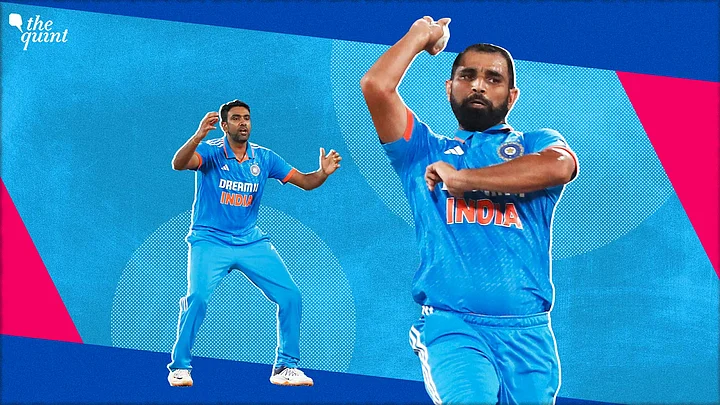Boarding the flight back home from Sydney, in 2015, Ravichandran Ashwin might not have predicted that in a couple of years, he will not feature in India’s white-ball plans. His team’s hopes of defending the World Cup had recently evaporated, albeit in that semi-final defeat to Australia, he was India’s most economical bowler in an otherwise spendthrift lot.
Nine years later, life came full circle for Ashwin. He was playing at a World Cup, against the same opposition from 2015’s agony, and starring in a victory, with a convincing bowling performance.
If you have read so far, you might feel this is a Ravichandran Ashwin tribute piece. Except, it is quite the opposite.
Ahead of the match against Afghanistan in Delhi’s Arun Jaitley Stadium, India must – irrespective of the opposition’s strength and the seeming disparity with the hosts – ditch the anachronistic don’t-fix-what’s-not-broken formula, by dropping (or, resting. Semantics!) the off-spinner.
How Did the Delhi Pitch Behave in the Last Match?
Depends on who’s asking. For the batters, it was the most ideal, utopia-turned-reality track. For bowlers, it was an execution warrant.
In the match between South Africa and Sri Lanka on 7 October, 754 runs were scored, which happens to be the highest run aggregate in a World Cup fixture. If the figure doesn’t portray a thing or two in isolation, here’s another statistic for added efficacy – those runs came in 94.5 overs, not 100. Meaning, at an ODI game, the aggregate economy rate was 7.98 runs per over.
Pace vs Spin Comparison
Purely on economy rate, with almost every batter going gung-ho, there was not much to differentiate between the pacers and the spinners. Although, the seamers were ahead both in terms of wickets – scalping 12 of 15, and average – with the difference to spinners being 13.5.
There was a contrast in purchase as well, if at all ‘purchase’ can be used on a torrential run-fest like that match. In the South African innings, Dilshan Madushanka – Sri Lanka’s left-arm pacer – generated swing, troubling both Quinton de Kock and Rassie van der Dussen in his first couple of overs.
The effect was more pronounced when Sri Lanka came out to bat, as while Lungi Ngidi managed to swing the ball both ways, Marco Jansen used a perfect in-swinger to dismiss Pathum Nissanka.
What Should India Do?
Between Feroz Shah Kotla and Arun Jaitley Stadium, the ground at the national capital might not have undergone radical infrastructural changes, albeit the nature of the track has certainly changed – as highlighted by the grass cover during 7 October’s game.
Even if some of it is trimmed down, a complete alteration in the nature of the track is unexpected. Hence, India should alter what they can control – their playing XI.
With the spin trio of Ravindra Jadeja, Kuldeep Yadav and Ravichandran Ashwin having done their tasks to perfection in Chennai, it might be time for Mohammed Shami to justify his selection in the team.
How Has Mohammed Shami Done in Delhi?
In a word – brilliantly. Or, if that sounds like an exaggeration – about enough to warrant a place in the team.
The speedster has played three ODI matches at the Arun Jaitley Stadium, wherein he has scalped seven wickets, making him the joint second-highest wicket-taker in ODIs at Delhi. Moreover, he was once a part of the Delhi-based franchise – then Daredevils, now Capitals – in the Indian Premier League (IPL).
In comparison, Ravichandran Ashwin has not played an international white-ball game in Delhi since 2013, and in the IPL, he has scalped only six wickets in nine matches.
Who Have Been India's Best Bowlers in Delhi Recently?
The last ODI match involving India at the Arun Jaitley Stadium – a year ago against South Africa – saw Kuldeep Yadav running riots, recording a four-wicket haul and helping his team bowl the opposition out for only 99 runs.
In terms of wickets distribution, however, that occurrence might seem like an anomaly. In four of India’s last five ODIs in Delhi, barring the one involving Kuldeep’s wizardry, India’s most effective bowlers have been pacers, with Jasprit Bumrah and Mohammed Shami being the most successful.
The Bottomline
With Delhi’s surface being significantly contrasting to that of Chennai, India should ‘twist’, and not ‘stick’, by fielding Shami in Ashwin’s place. Not because the latter put a foot wrong against Australia, but because he, and in general, the spinners, might not put a foot right in Delhi, unless the surface changes drastically overnight.
(At The Quint, we question everything. Play an active role in shaping our journalism by becoming a member today.)
